




 |
   |
 |
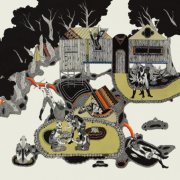 |
III (2009, 47.32) ****/T |
|
| I Can't See Clear The Road of Golden Dust Caroline The Pearl That Which Darkly Thrives Sightings Meridian Another Moon Song |
Colony Trollsländia |
|
Current availability:
Mellotron used:
Given that Philadelphia's Espers are led by latter-day Mellotron fiend Greg Weeks, I've been waiting for them to use the thing themselves for a while. A folk/psych/prog outfit, they specialise in slow, quiet songs that build up to huge, guitar-driven climaxes, although not in a duff, post-rock kind of way. Their first two albums are well worth hearing, but they only finally get some Mellotron in on 2009's III, an album not dissimilar to its predecessors, if less electronic, top tracks including That Which Darkly Thrives, Meridian and Another Moon Song.
Weeks plays insistent Mellotron strings on Another Moon Song, although they could easily have enhanced several other tracks, too. Overall, then, another Espers triumph, assuming you like the sound of what they do. Incidentally, it appears there's an Espers album slotted in between I and II, 2005's covers collection The Weed Tree, including a Blue Öyster Cult cover that isn't (Don't Fear) The Reaper, namely the stunning Flaming Telepaths. Hurrah! Now all I need to do is track a copy down...
See: Greg Weeks
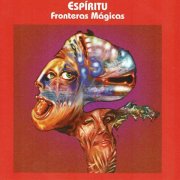 |
Fronteras Mágicas (2003, 67.58) ***/½ |
|
| Polarians Sin Fronteras Una Palabra Para el Nada Que Decirte Frío Cosas Que Llevan a la Mar Ciudad de Locos |
Caleidoscopios Psicosis 2002 Un Viaje por los Recuerdos Réquiem X |
|
Current availability:
Mellotron used:
Espiritu were probably Argentina's premier progressive outfit in the mid-'70s, although they only released two albums at the time, plus another two in the early '80s and what seems to be their final studio outing in 2003, Fronteras Mágicas. Led by sole original member, guitarist Osvaldo Favrot, this is a decent enough record, if overlong; it doesn't besmirch the band's good name, but nor does it add anything significant to their canon. It's probably at its best on instrumentals Frío and Caleidoscopios, and the rockier Psicosis 2002, but much of its material veers too close to sweeping Latin balladry with a prog edge for my tastes.
New keyboard player Ernesto Romeo (Klauss, Pez) does a good job, ripping out a handful of MiniMoog and Hammond solos, but his (genuine) Mellotron work is minimal enough that you feel he got some on the album simply to say he'd done so, with naught but a brief chordal strings part on the instrumental Frío. The chordal choirs on Para El have a Mellotronic ring to them, but sustain far too far to be real, even given the 'infinite choir' technique. Incidentally, while Romeo is credited with Mellotron on the following year's live En Vivo, neither the booklet pics nor live footage from the time show anything of the sort.
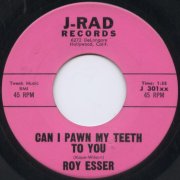 |
7" (1963) **/TT½ Can I Pawn My Teeth to You Man Do I Like Friday |
Current availability:
Chamberlin used:
Roy Esser probably never existed as such, almost certainly being one of many, many noms-de-plume used by song-poem producers through the '60s and '70s. The hysterical Can I Pawn My Teeth To You b/w Man Do I Like Friday is every bit as awful/brilliant as the genre's better-known (such as they are) efforts, 'Esser' singing in a style that must've sounded dated even in the early '60s.
Ron "Leigh Crizoe" Solovay plays Chamberlin, with orchestralish strings slathered all over both sides of the record, with other sounds a distinct possibility. If you really must hear this, both sides are on YouTube. Don't say you weren't warned.
 |
Unwrapped (2003, 63.14) ***/T½ |
|
| A Little Push Te Amare Your Picture Wrapped Time Waits In the Meantime Dangerous Game Into You One Name |
I Will Always Need Your Love Say Goodbye I Wish You You Famous Te Amare (Spanish) Tu Fotografia Hoy Mientras Tanto |
|
Current availability:
Mellotron used:
I had no idea Gloria Estefan had been around for so long; the Cuban-born songstress joined the Miami Sound Machine in the early '80s, admittedly while still in her teens and has recorded in both English and Spanish throughout her career. After the Spanish-language Alma Caribeña in 2000, Unwrapped is Estefan's first English-language album in five years, although, admittedly, it's only her second in that time in any language. I'm not au fait with her earlier, poppier material, but Unwrapped consists largely of Latin-flavoured folkish tracks; actually perfectly listenable, although I wouldn't exactly recommend it to those who wish to journey away from the mainstream.
Ron Taylor plays Mellotron on the album, with flute parts on Wrapped, In The Meantime and Say Goodbye; none outstanding, though all pleasant. The last four tracks on the album are Spanish-language versions of tracks 2, 3, 4 and 6, with identical backing tracks, so it's a bit of a cheat saying there are five Mellotron tracks here, which is reflected in the 'T' rating. So, perfectly pleasant Latin-flavoured folky pop, a few nice bits of Mellotron flute. That's it.
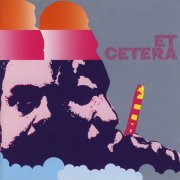 |
Et Cetera (1971, 40.01) ***/½Thursday Morning SunriseLady Blue Mellodrama 2a Raga Milkstreets |
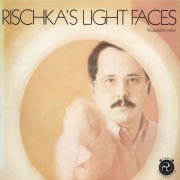 |
Rischka's Light Faces [as Rischka's Light Faces] (1971, 38.49) ***/TIntroductionTaxi to Musberg Rischka's Light Faces Heikideiki Rischka for Rogue's Gallery Om Mami Padme Hum Bumm-Bumm's Lullaby |
Current availability:
Mellotrons used:
Wolfgang Dauner and Eberhard Weber's Et Cetera were, going by their eponymous 1971 debut, a jazz-rock-bordering-avant-garde outfit, near-unlistenable in places; pretty out there for the time. Stylistically, of course, they're all over the place, from eleven-minute opener Thursday Morning Sunrise's borderline-atonal fuzz bass and frantic rhythms, Lady Blue's piano and choral voices, Mellodrama 2a's Indian percussion and strummed acoustics... I think you get the idea. Dauner plays a tiny smattering of Mellotron, most likely a machine (MkII?) lying around in the London studio they were using, with a brief volume-pedalled, heavily reverbed string part on the amusingly-named Mellodrama 2a. Various CD reissues of Et Cetera add different bonus tracks, but you won't hear any more Mellotron.
The same year's Rischka's Light Faces is a most bemusing release: although it's by Et Cetera, not only is there no mention of them anywhere in the package, but the labels (and only the labels) also say 'Iris, Inri, Pencil & Psalm', whatever that may mean. Is that the title? Is Rischka's Light Faces the artist name? Does anyone know? The album was recorded in a single day (!), in fact, the day after Et Cetera; while it (unsurprisingly) bears comparison with that album, its emphasis is more on the strange, groaning, ambient end of their oeuvre. They also tackle twisted jazz/blues on the title track (if title track it is) and Om Mami Padme Hum, which struggle to make the album any the more listenable. Roland Wittich on Mellotron this time, with crazed, pitchbent saxes on Heikideiki's intro, an alternate version of the 'previous' album's Mellodrama 2a, repeating throughout.
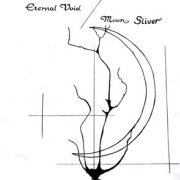 |
Moon Sliver (2013, recorded 1977, 43.19) ***/TTTTPirates PuppetThe Black Stream Devils Workshop Peasant Song Sliver A Face at the Window... A Mind at the Door Overburden Stone Dance of Lunacy |
Current availability:
Mellotron used:
Craig P. Smith bought his M400 from Mark Dahlgren of Albatross, subsequently utilising it on several projects, not least Eternal Void's instrumental recordings from 1977, finally officially available (admittedly only on YouTube). Moon Sliver is a slightly mixed bag, shifting between lengthy psychedelic experimentation (opener Pirates Puppet), King Crimson-esque progressive rock (The Black Stream), mournful Mellotron solos (Peasant Song), ambient warbling, lurching into full-blown lo-fi space-rock (Sliver itself) and avant-Black Sabbath (Overburden Stone). Patchy? In places, definitely, but this is the sound of a band finding their feet, although it seems they fell apart before they could make any professional recordings.
Craig gets that Mellotron onto most tracks, with cellos, rather wobbly flutes and phased strings all over Pirates Puppet, a strings/cello mix throughout The Black Stream and Peasant Song, a murky version of the same sound on Sliver itself, cellos on A Face At The Window... A Mind At The Door, phase shifted strings on Overburden Stone and gongs (!), boys' choir and pitch-shifted strings on Dance Of Lunacy (info on the last two courtesy of Craig). You're not going to listen to Moon Sliver for its immaculate song construction or professional production values, you're going to listen to it for its experimental attitude and shedloads of slightly murky Mellotron. It's free; what have you got to lose? Incidentally, a 2010's reformation attempt ultimately became Neutral Earth, Mellotron present and correct.
See: Providence | Craig P. Smith | Neutral Earth
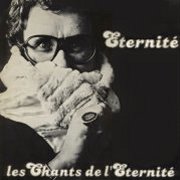 |
Les Chants de l'Éternité (1977, 32.33) ***/TTMême SiApocalyptus L'Extrême Matin Magique Concert Magnétique Il Vente la Vie |
Current availability:
Mellotron used:
Éternité were a one-off Québecois progressive outfit, working at the lighter end of the symphonic spectrum on 1977's Les Chants de l'Éternité. The album's at its best on Apocalyptus and the overblown Magnétique, although Concert sounds a lot like a French-language take on Renaissance's surprise hit of that year, Northern Lights, while Matin Magique is merely limp.
Michel le François plays (presumably his own) Mellotron, with strings all over Apocalyptus and flutes and chordal choirs on Magnétique, although you're probably not going to track this down for that alone. Passable Québecois prog, but it's noticeable that the ProgQuébec label haven't reissued it yet.
See: Michel le François
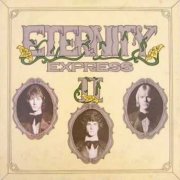 |
Eternity Express II (1974, 29.34) **/TT½Jesus is the WayWhere Could I Go Front Seat, Back Seat I'll See You in the Rapture Freedom Rock and Roll Be Nice to the Little Guy You Should Have Come Sooner! |
Current availability:
Mellotron used:
Eternity Express were a Jesus Rock outfit consisting of Nathan, Mike and Dan Gaub (presumably brothers, rather than cousins). They formed in the early '70s, their career lasting fifteen years and several albums, horribly, subsequently making a couple more as Illustrator. I've seen 1974's Eternity Express II lauded for its 'garage' production, more easily described as 'cheap', sounding as if they spent, ooh, at least a two-figure sum on the recording. The best this sorry effort manages is probably the fuzz guitar rock'n'roll of Where Could I Go, but the cheesy country of Front Seat, Back Seat is hard going, while Freedom is utterly, utterly awful, to the point where hysterical laughter really is the only option.
Someone, quite possibly Nathan, played Mellotron, with the strange combination of mellow strings and strident brass all over opener Jesus Is The Way. All together now, "Jesus is the answer", PARP! PARP! "He's the answer", PARP! etc. etc. After that highlight the strings on I'll See You In The Rapture, combined strings and brass on Freedom and strings on closer You Should Have Come Sooner! (fnar fnar) come as a slight disappointment. Absolute drivel, then, but at least it's (vaguely) amusing drivel.
 |
Breakdown (1999, 51.20/65.45) ***/TTT |
|
| Breakdown Angels Would Fall Stronger Than Me Into the Dark Enough of Me Truth of the Heart Mama I'm Strange Scarecrow |
How Would I Know My Lover Sleep [Enhanced ed. bonus tracks: Touch and Go Cherry Avenue Beloved] |
|
Current availability:
Chamberlin used:
Melissa Etheridge was discovered in the early '80s, although it took until '88 for her to release her first album. 1999's Breakdown is her sixth release, an Americana-infused set of singer-songwriter material, not unlike Joan Osborne's approach, possibly at its best on the opening title track, Angels Would Fall and Scarecrow, an anti-bigotry plea, although fans of her work are unlikely to be disappointed with anything here.
Patrick Warren does his usual Chamberlin thing, in full 'orchestral-replacement mode', with strings on Stronger Than Me, chordal flutes and strings on Into The Dark, strings on Truth Of The Heart, Scarecrow and closer Sleep, and strings on all the enhanced edition's extra tracks, Touch And Go, Cherry Avenue and Beloved. I'm not going to pretend that Etheridge's music speaks to me—by and large, it doesn't—but that isn't to denigrate what she does. A fine album within its oeuvre, with plenty of Chamby work.
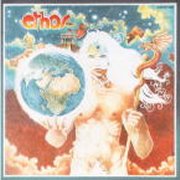 |
Ethos (Ardour) (1976, 46.43) ****/TTTT½Intrepid TravellerSpace Brothers Everyman Atlanteans The Spirit of Music Longdancer The Dimension Man E'mocean |
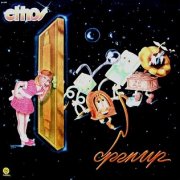 |
Open Up (1977, 39.53) ****/TTTTPimp CityStart Anew U.V. Melody Memories The Players (of the Game) Marathon II Sedona Close Your Eyes |
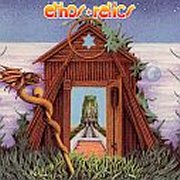 |
Relics (2000, recorded 1973-74, 62.01) ****/TTTT |
|
| Nightingale Elephant Man Placebo Identity Experimental War Troilus and Cressida Intrepid Traveler Doing Your Duty |
Perceptions Pimp City Dream [hidden track] |
|
Current availability:
Mellotrons/Chamberlins used:
Ethos were that rarest of things; an American progressive band who got a major label deal. Capitol signed the band around 1975 and let them release two albums before (presumably) pulling the plug. Of course, while in Britain it was punk that scuppered prog, in the States it was disco; unlike punk, a major-league cash cow for the record companies, without too much financial input. I say 'Ethos'; in fact, it's difficult to work out from this album whether they called themselves Ethos or Ethos (Ardour), but their recent retrospective set loses the '(Ardour)', so I shall too.
Despite being released as late as 1976, Ethos (Ardour)'s sleeve lays their, er, ethos out for all to see; a naked god-like being with star-shaped nipples (!) and long white hair holding a staff with a snake wrapped round it in one hand and a strangely reversed globe in the other, against a backdrop of cosmic-looking clouds and ancient pyramids. The lyrics are mostly science-fictional stuff involving Atlantis, space etc., which can all be ignored given the quality of the music. This isn't top-notch prog, but it's still good stuff, with lashings of both Mellotron and Chamberlin on every track from L. Duncan Hammond and Michael Ponczek (top example: the intro to Space Brothers, featuring Chamby solo female voice over Mellotron 8-voice choir). Like all good prog bands they list all their equipment on the sleeve and include a very fetching picture of singer/guitarist/main man Wil Sharpe with his Gibson twin-neck. Songs titles like Space Brothers, Atlanteans and E'mocean ('emotion', duh) defiantly fly in the face of all that was American in 1975, but since when have we had any argument with that? I hope I'm not sounding like I've got a downer on this album; the music is excellent, it's just the (even by then) outdated hippy-dippy stuff that will put some potential listeners off.
By their second outing, Open Up, Hammond had left, taking his Mellotron with him, leaving original keys man Ponczek covering all bases, including Chamberlin. On a first listen, the material is probably up to that of their debut, though, like all good prog, I expect it'll take a few listens to really appreciate. With Chamberlin on all tracks, it's difficult to pick out highlights, although the strings work on Pimp City and Marathon II are excellent. Brass on several tracks, too, with the occasional burst of flutes, including on the thirty-two-second U.V. Melody.
In 2000, an archive set, cheekily entitled Relics appeared, containing demos and live tracks from 1973-74, including early versions of both Intrepid Traveler and Pimp City. The material isn't all as good as that on their two proper releases, but most of it's pretty much up to scratch, making this a welcome find. The hidden track at the end is a slightly pointless instrumental jam, but as with most of the other tracks, it's got loads of (L. Duncan) Hammond and Ponczek's Mellotron and Chamby work, the only obvious exception being Intrepid Traveler, replacing the later version's Mellotron with string synth. Tape replay highlights are the great strings pitchbend work on Placebo and a lengthy section of flute lead on Experimental War, but there's little to knock here, to be honest.
 |
Marvin Country! (2012, 68.08) ***½/T |
||
| You Possess Me The Grapes of Wrath You Are the Light Lay it on the Table A Man Without a Country Living Like a Hobo Son of a Carpenter Ain't No Work in Mississippi |
Bob Dylan is Dead Miss This World It Don't Cost Much Where's Your Analog Spirit? Diamond in the Sky Gram Revisited Hard to Build a Home |
What's Patsy Cline Doing These Days? pt. I What's Patsy Cline Doing These Days? pt. II Trouble Holding Back There's a Train God's Little Mansion Ain't No Work in Mississippi Hold Fast Your Dreams |
|
Current availability:
Mellotron used:
Marvin Etzioni is a founding member of '80s cowpunks Lone Justice, which is enough to give him proper country kudos, at least 'round these parts. 2012's two-disc set (although it would fit on one) Marvin Country! has apparently been 'in development' since 1985, which makes famous other long-awaited projects look quite fleet of foot. It's a collection of prime Americana, recorded with a host of guests, not least Lucinda Williams, X's John Doe, Steve Earle and our very own Richard Thompson. Top tracks? Hard to say, but both version of Ain't No Work In Mississippi (with Earle and The Holy Brothers), Hard To Build A Home and Trouble Holding Back all stand out.
I'm not sure why it takes both Etzioni and Eitan Bernstein to play the squawking (and obviously real) Mellotron strings on Trouble Holding Back, but there you go. Just in case you're not convinced, the tape wow and flutter at the end of the track should change your mind. A good set, then, that doesn't outstay its welcome, despite its length.
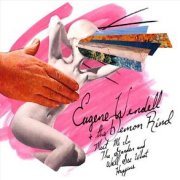 |
Meet Me in the Garden & We'll See What Happens (2011, 19.51) ***/TOh NoMark 3:16 Foggy Mountain Woman Somebody Good Four o'Clock Rock The Demon Rind Love These Things Those Fuckers Layers of Paint |
Current availability:
Mellotron used:
Going by 2011's Meet Me in the Garden & We'll See What Happens, Eugene Wendell & the Demon Rind (now just The Demon Rind, as they've presumably tired of being asked 'which one's Eugene?') play a raucous, off-the-wall variety of indie, possibly at its best on the twisted boogie of Foggy Mountain Woman and The Demon Rind.
Ian Moore plays a raft of instruments, including, going by the upfront string part on Mark 3:16, real Mellotron, which makes a nice change in these post-millennial, post-actual Mellotronic days. An odd little EP, then; where they sourced a real Mellotron (assuming I'm right) will have to remain a mystery. Note: Wendell Eugene was an American jazz trombonist; the band's original name was presumably a send-up.
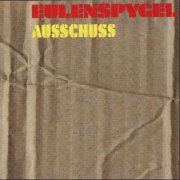 |
Ausschuss (1972, 45.50) ***½/TTAbfallMenschenmacher Teufelskreis Herzliches Beileid Der Fremde Untertanenfabrik |
Current availability:
Mellotron used:
Eulenspygel started life as Royal Servants, with 1970's We being their sole release; confusingly, after their name and style change, Eulenspygel called their first album Eulenspygel 2 (apparently one of the first German-language rock albums), clearly considering the band a straight continuation of the original outfit. Their follow-up, Ausschuss (Ausschuß on the CD reissue), consists of a slightly unwieldy mixture of proto-krautrock, more straightforward proggy material and mainstream rock, its highlight probably being the side-long four-part Abfall, which shifts seamlessly through the band's various styles, rather overshadowing the rest of the album in the process, although it picks up a little towards the end.
The album was recorded at London's Apple Studios, which explains the murky MkII-ish Mellotron parts on a few tracks; I wonder which Beatle's machine we're hearing? Anyway, the first sound on the record is the faint flutes and strings on the first part of Abfall, from guitarist James "Till" Thurow, with the strongest Mellotron use on the track's last part, a rising string line surging up through the mix over the course of a couple of minutes, alongside the Hammond. Der Fremde has a minor strings part, with a stronger strings/flutes part on closer Untertanenfabrik, although not enough to make this a Mellotron Album per se.
 |
7" (1970) ***/T Sing No Love Songs Jump Down Turn Around |
Current availability:
Mellotron used:
In 1970, Aussie outfit The Groove changed their name to Eureka Stockade (after a famous incident in Australian history), releasing just the one single, Sing No Love Songs b/w Jump Down Turn Around. The 'A' is a rather dated pop number, sounding more '68 than '70, frankly, although the flip is slightly gutsier, if not exactly about to challenge the era's hard rock.
(Presumably) keys man Tweed Harris plays MkII Mellotron strings on the 'A', in full-on 'orchestral replacement' mode, although the flutes on the flip are clearly real. Do you need to hear this? Not especially, but it's on YouTube if you do.
See: The Groove
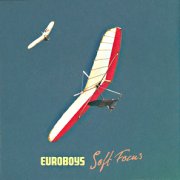 |
Soft Focus (2004, 51.28) **½/T |
|
| Break Away Sleep 'Til Tomorrow Hold on Fears Be Gone Topanga One-Way Street 24 Years Good Enough for Now |
Pharaoh Soft Focus Crystal Pipeline |
|
Current availability:
Mellotron used:
Norwegians The Euroboys (previously known as Kåre & the Cavemen at home) have been around since 1990, releasing their first album, Jet Age, under their original name in 1997. 2004's Soft Focus is their fifth album overall, best described as quieter-end-of-indie, I think; I've certainly heard a hell of a lot worse, although it's a long way from 'exciting', by my exacting standards. Basically, it wafts along without really impinging on the listener too heavily, which is almost certainly what the band wanted, so job done.
Mellotron on two tracks, with strings from Mats Engen on Fears Be Gone and Knut Schreiner on Topanga, with some authentic wobbles at the end of the latter, neither particularly overt parts, nor something you desperately need to hear. I can probably say the same for the album, to be honest. Average.
See: Samples etc.
 |
Evan & Jaron (2000, 44.37) **/T½ |
|
| Outerspace Ready or Not Crazy for This Girl Done Hangin' on Maybe Distance Wouldn't it Be Nice to Be Proud Pick Up the Phone From My Head to My Heart |
On the Bus You Don't Know Me Make it Better I Could Fall |
|
Current availability:
Mellotron used:
Identical twins Evan and Jaron Lowenstein began making music together as Durable Phig Leaf, thankfully changing to their better-known nomenclature before long. A successful major-label debut (1998's We've Never Heard of You, Either) was followed by 2000's Evan & Jaron, a mainstream pop/rock effort of the kind popular at the time; for some reason, this kind of stuff always makes me think of Seattle, a city I've never visited, while the twins are from the other side of the country (Atlanta, GA, to be precise), anyway. If I were to be generous, I'd call it 'harmless'; if I weren't, it'd be 'guff'. It doesn't actually produce aural pain, in fairness, but it's all desperately unexciting stuff with few redeeming features, though at least they've got that 'close relative/close harmony' thing going on (see: The Beach Boys for details).
Jaron plays Chamberlin, with occasional strings on Done Hangin' On Maybe, cellos on Distance, flutes on You Don't Know Me and more audible strings on Make It Better and strings and flutes on closer I Could Fall, although the cello-ish sound on Wouldn't It Be Nice To Be Proud sounds like something else. None of the use is particularly major, thus the relatively low T rating. So; some passable Chamby work, but not something you're going to want to hear even once unless you're a glutton for punishment mainstream pop.
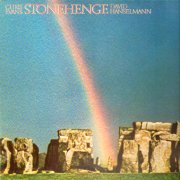 |
Stonehenge (1980, 39.27) **/½Sunrise - Stonehenge ThemeSalisbury Plain The Stones of Avebury Earth Magic Silbury Hill Genesis Glastonbury, Temple of the Stars Cadbury Castle, King Arthur's Camelot Epilogue - Stonehenge Theme |
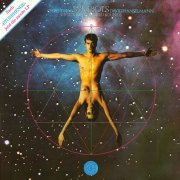 |
Symbols of the Seven Sacred Sounds (1981, 36.44) **/½ |
|
| Intro 1 DO: Dominus 2 RE: To a Lady Sleeping 3 MI: One Small Step for Mankind 4 FA: Where is it Ever Leading to? 5 SOL: Tears of Heaven 6 LA: A Question of Dimension 7 SI: Colours |
8 DO: Dominus (Reprise)
Epilogue |
|
Current availability:
Mellotrons used:
Chris Evans(-Ironside) and David Hanselmann (Message, Triumvirat and others) made two albums together, 1980's Stonehenge (stop laughing at the back) and the following year's Symbols of the Seven Sacred Sounds (I said stop!). Stonehenge is a prime, if lesser-known example of the era's strange fascination with cheesy, prog-lite concept album (think: War of the Worlds), this one based on some weird new age mashup, complete with soft metal guitars, Hanselmann's strident vocals and more synths than you can shake a stick at. Actually, I'll tell you who this nonsense reminds me of: Chris de bloody Burgh, when he still appealed (exceedingly vaguely) to lightweight prog fans. Any better moments? Possibly Earth Magic, as a) it's short and b) it's instrumental. Worst? Where do I start? The Stones Of Avebury? Genesis? Thinking about it, probably Glastonbury, Temple Of The Stars, which sets William Blake's Jerusalem to a new (and hideous) tune, thoroughly trashing it in the process. Evans plays keys, including Mellotron, with distant choirs on the aforementioned Glastonbury, distinct from the real voices on the album.
Symbols of the Seven Sacred Sounds is more of the same, this time a concept based on the Western eight-note scale (it says here), although quite how that manifests itself in the music is beyond my clearly limited understanding. It's at its least awful on the grammatically-challenged Where Is It Ever Leading To?, but it's a close call. More of Evans' minimalistic background Mellotron choirs, this time on Tears Of Heaven. Seriously, these albums are absolute dross, with next to no Mellotron as a sweetener. Avoid.
 |
Evelio (2006, 41.02) **/TChangeFear of Drowning White Horses In 2 A Child Again Maroon Sky Dia del Sol |
Current availability:
Chamberlin used:
Evelio (a.k.a. The Red Album) is Peruvian-born Evelio Romero's debut, a dance-pop/electronica effort, not a thing guaranteed to get Planet Mellotron's heart racing, or at least, not in a good way. It seems competent enough, although there are no obvious best tracks, not helped by most of them being at least two minutes too long.
John Philip Shenale plays Chamberlin, although it's difficult to tell where, precisely. My money's on the strings on opener Change and the high strings and cellos on White Horses, but I could be wrong on both counts.
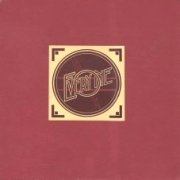 |
Everyone (1971, 35.26) ***/½Trouble at the MillSad Midnight Shift Don't Get Me Wrong Sitting on a Rock Too Much a Loser Radio Lady This Way Up |
Current availability:
Mellotron used:
It seems there are two different versions of Andy Roberts' Everyone's sole eponymous album, the Polydor issue (possibly retitled Andy Roberts With Everyone, for their vocalist/guitarist/leader) shifting tracks around, losing a couple and adding their take on Neil Young's Cowgirl In The Sand. The original B & C issue is structured slightly oddly, alternating shorter, countryish tracks with longer, keyboard-driven proggier efforts (mostly written by organist Bob Sargeant), climaxing with the excellent This Way Up, making for a slightly unsatisfactory listen in places. Effectively, the even-numbered tracks are the ones to listen out for, with the likes of Trouble At The Mill and Midnight Shift being a bit of a waste of space.
Sargeant doubled on acoustic guitar and various keyboards, including a credited Mellotron, although, sadly, the only place it's at all obvious is a few seconds of faint strings at the end of the lengthy, proggish Sad, probably the album's next best track. Anyway, while I doubt that it's worth an awful lot, Everyone is obscure enough to be fairly hard to find and while it has a few decent tracks, its Mellotronic input is absolutely minimal, should that influence your decision. Incidentally, there's some confusion over Roberts' solo discography, too; his solo album (featuring the Mellotron) from the previous year, Homegrown, was available in two wildly differing versions, while Sargeant produced a Mellotronic effort in '74, First Starring Role.
See: Andy Roberts | Bob Sargeant
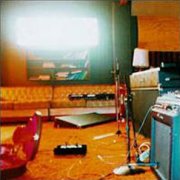 |
Library Nation (1999, 49.58) ***/T |
|
| 13,000 Times Bigger Than the Earth My Dream Girl Puts on Her Shoes Green Sector 2 The Evil Tambourines Theme Song Pathways Return to Burn And We Get High and We Elope Saturn |
On Mars and Venus Library Nation Rollerskate! |
|
Current availability:
Mellotron used:
The Evil Tambourines have completely confounded my expectations on their sole release, 1999's Library Nation, by occupying the sparsely-populated middle ground between alt.rock, cool jazz and hip-hop. But is it any good?, I hear you cry. Short answer: yes. Not my bag, not by a long way, but thoughtful, intelligent and impeccably produced.
Built to Spill/Truly man Robert Roth plays (presumably) his own M400 on Return To Burn, with a (kind of) melodic flute part running through the track. I'd be lying if I said this was worth the effort for a single Mellotron track, but it's nice to hear an experimental album that doesn't simply disappear up its own arse.
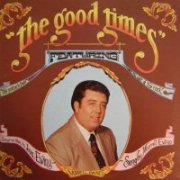 |
The Good Times (197?, 37.52) ½/T |
|
| Cleft in the Rock The Good Times (Always Outweigh the Bad) It'll Be Different (the Next Time You Come) New House The Potter's Field That's How He Found Me Those Were the Days Contrast |
Write it All Down (It's a) Long Way to Heaven |
|
Current availability:
Mellotron used:
Mark Medley, you're a dead man. Mark insists on sending me lovingly-transferred vinyl rips of the most appalling God-bothering shite imaginable, although I keep begging him to stop. I can see I'm going to have to start sending cash, used notes only. His latest 'offering' is Murrell Ewing's typically-for-the-genre undated The Good Times, probably from the mid-'70s, going by the instrumentation, although Ewing's 'image' (I use the term extraordinarily loosely) in the sleeve pic could put it at a decade earlier.
Although probably considered 'gospel' at the time, the album's vile contents are more piano-led Christian campfire singalong with occasional country touches, notably the pedal steel on a few tracks. Ewing sings in a style not unlike famed UK absurdist comic Vic Reeves' 'pub singer' style, all restricted air passageway and preternaturally controlled embouchure, heard at its best (?!) as he (just) hits the high notes on Contrast; this really does have to be heard to be believed, I can tell you, although I wouldn't take that as any, make that ANY kind of recommendation whatsoever. Top comedy moment? I'm not sure the term's fully relevant here, but the backing vocals on That's How He Found Me are pretty laughable, ditto the puke-inducing 'wedding scene' that closes Those Were The Days (no, I'm not joking) and the barely-repressed sexual tension (no, really) for his 'Lord' on Contrast.
One Lari Goss plays Mellotron on a handful of tracks, with faint strings on opener Cleft In The Rock (cleft in your fucking head, more like), The Potter's Field, Those Were The Days and Contrast and more upfront ones on New House, although I'd be lying shamelessly if I said it improves matters any. Bishop Ewing died in 2010; a tragedy for his family, friends and congregation, I'm sure, although as long as his passing doesn't trigger a non-overdue reissue of this crud, the event will probably pass the rest of us by. Incidentally, Mark Medley, you're a dead man. As dead as Murrell Ewing.
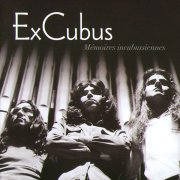 |
Mémoires Incubussiennes (2008, recorded 1974 & 2008, 41.32) ****½/TTTBléatisAbomination d'Une Quarte de Triton Parade de l'Armée de Verre (au Matin) Teeth Apple Tree Paradise Tales of the Tree Pendergast A Child's Funeral |
Current availability:
Mellotron used:
Québecois Incubus recorded a handful of tracks during their early '70s existence, reforming over thirty years later as ExCubus, to avoid confusion with the better-known American band. The first four tracks on 2008's Mémoires Incubussiennes comprise those 1974 recordings, the rest being newly-recorded versions of older material. To echo other reviews sites... Wow! High-quality heavyish semi-instrumental prog, like a cross between the less out-there aspects of King Crimson and your 'typical' French/Québecois sound of the period. While it's tempting to laud the original recordings (not least for their Mellotron content), this is excellent throughout, even the English-language vocals on the new recordings passing muster. It's mildly futile trying to pick out highlights, although Parade De L'Armée De Verre (Au Matin) and Tales Of The Tree possibly have the edge.
Michel Phaneuf plays Mellotron on the '70s tracks, with a major, upfront string part halfway through opener Bléatis, a strings/brass mix towards the end of Abomination D'Une Quarte De Triton, a couple of flute melodies and chordal strings on Parade De L'Armée De Verre (Au Matin) and upfront strings and brass on Teeth. The relevant tracks were recorded at France's legendary Chateau d'Herouville, but I have no idea whether the Mellotron was a studio machine, the band's own (shipped across the Atlantic?), or was hired in for the sessions. ExCubus have gone on to release a second (Mellotron-free) album, 2011's Lagauchetière, although I've no idea whether they're still a going concern, several years later. Either way, this is fully worthy of your hard-earned. Buy.
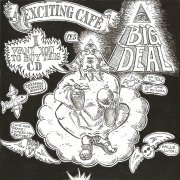 |
Big Deal (1995, 66.03) **½/½ |
||
| On Line Rats Mobile Clowns Once You've Got Them By the Balls Prayer for Michael Nick Leesons Party Catastrophy at No. 10 |
Six Pack Woman ? Part 1 Silicon Valley Where's the Spiritual Boss Vive Chirac Greenpeace Paranoia Quite a Day |
Just Make Believe Briefing With the Maestro Luto on Pluto ? Part 2 Wo ist Mein Klo Part of the Game Six Pack Woman (Rude Nude Version) |
|
Current availability:
Mellotron used:
The quite superbly-named Exciting Café are an Austrian outfit comprising ex-Iviron man Ingo Schleicher-Atanasov and a cast of thousands. Their first album, Big Deal, came out around '95 and seems to be some kind of rock opera/concept thingy, or even the soundtrack to a theatre show, not unlike the lone Future Shock album. Think 'vaguely akin to Frank Zappa, or possibly German lunatics Spliff' and you won't be a million miles off. But does that combination make for great music? Er, not really, no. It feels like the music is only the second most important ingredient here, with sort-of prog (On Line) morphing into straightforward pop/rock (Rats), to jokey oom-pah (Mobile Clowns) to cheeso balladry (Prayer For Michael), not to mention crummy unaccompanied rock'n'roll (Six Pack Woman), updated musical theatre (Where's The Spiritual Boss) and dirgelike German jazz-funk (Wo Ist Mein Klo). Best tracks (yes, there are a few)? Probably On Line, the acoustic Nick, the slightly jazzy flute piece Greenpeace Paranoia and Luto On Pluto, but they're few and far between, to be honest.
Despite the presence of two Mellotron players (Schleicher-Atanasov and Hans Gattringer), unless I'm much mistaken, it's only to be heard on one track, opener On Line, with a cello line echoed by strings later in the instrumental piece. Despite its relatively recent release, this is wildly obscure (thanks to Wolfgang for providing my copy) and, unlike the Iviron album, probably isn't worth the effort involved in tracking it down. Interesting, in a quirky kind of way, but ultimately inessential.
See: Iviron
 |
Damit du Mich Hörst... (1979, 39.23) **/T |
|
| Damit du Mich Hörst Kyrie I Kommt in das Neue Land Alleluja Lachen Vater Unser Deinen Tod Friedenslied |
Agnus Dei Der Uns Aufweckt Die Konturen Thomaslied Bootlied Epilog: Mein Lied |
|
Current availability:
Mellotron used:
What to make of Exodus, other than that literally dozens of other bands have used the name? If a chap on Instagram is to be believed, they were a German Christian outfit, hailing from somewhere in the region of Schermbeck, north of Essen, who released just two albums. After hearing their debut, 1979's Damit du Mich Hörst... (So That You Hear Me), perhaps we should be grateful? At its best, it's a slightly proggy folk effort featuring male/female vocals; sadly, it's rarely at its best. Most of it consists of twee, mock-gospel drivel like Kommt In Das Neue Land, Deinen Tod, Die Konturen and the awful Thomaslied, while better material includes the opening title track, Agnus Dei and obvious album highlight, mini-epic Bootlied, although, in this case, 'better' doesn't actually mean 'necessarily any good'. Everything is relative.
Keys man Lutz Neugebauer plays Mellotron (did Tonstudio Langendreer have an M400?), with choirs on the title track and Lachen, although all strings hail from a string synth, in true German style. If you should stumble across mentions of this album cynically describing it as 'kraut' or 'prog', beware: it is neither. Bootlied aside, this is actually quite horrible. Avoid.
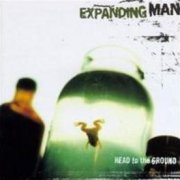 |
Head to the Ground (1996, 47.24) **½/½ |
|
| Put Me Out Download (I Will) Disappear Starman Okay Fine Screws Underground Blood Red Crush |
It's Not Me Head to the Ground Goodbyes |
|
Current availability:
Chamberlin used:
The Long Island-based Expanding Man are generally described as 'post-grunge', although their sonic links to the likes of the tedious Pearl Jam seem a little tenuous to my ears. 1996's Head to the Ground was their first full album, although their lack of any noticeable 'quirk' probably consigned them to the dustbin of history almost immediately. They recorded a second album, but after being comprehensively fucked over appallingly by Universal (do you really need a reason never to sign to a major?), they quietly split. Head to the Ground starts well enough, stronger material including opener Put Me Out and Download (I Will), but the album soon becomes mired in second-rate stuff like It's Not Me and the title track.
Producer Mike Denneen (Gigolo Aunts, Velvet Crush) plays Chamberlin, with a brief, faint string part on Starman and an even briefer and fainter one on Screws, but hardly the kind of use that'll have you rushing out to score a copy of this record. This would probably have made an excellent mini-album, but nearly fifty minutes is at least twenty too many.
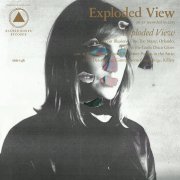 |
Exploded View (2016, 39.32) ***/T |
|
| Lost Illusions One Too Many Orlando Call on the Gods Disco Glove Stand Your Ground No More Parties in the Attic Lark Descending |
Gimme Something Beige Killjoy |
|
Current availability:
 |
Mellotron used:
Although I've listed Exploded View as a British/Mexican project, vocalist Annika "Anika" Henderson actually lives in Berlin, despite being British-born, so perhaps we should simply think of them as Mexican? Anyway, their eponymous 2016 debut takes inspiration from krautrock, trip-hop (Anika worked with a Portishead side-project at one point) and other experimental, synth-based musics. The end result is something that's more likely to appeal to those into the experimental end of the indie scene (such as it is), rather than fans of Can et al.; Anika's faux-robotic tones are definitely an acquired taste, as are the sounds Hugo Quezada gets out of his impressive collection of vintage synths. I find myself unable to accurately describe their music: uneasy listening? That's what YouTube's for, folks.
Quezada's much-mooted Mellotron isn't actually used that much here, unless he's got some seriously odd sounds installed, which doesn't seem likely. In fact, it's only audibly used on Stand Your Ground, which features an upfront repeating flute part. I've given this three stars for its ambition; I actually can't tell whether the music is any 'good' or not. Incidentally, they followed up with 2018's seemingly Mellotron-free Obey, since when the band have apparently gone into hibernation.
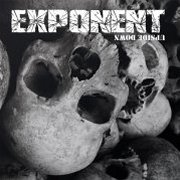 |
Upside Down (2014, recorded 1974, 41.49/48.03) ***½/T½DuplicateLast Spring Thoughts Dream [CD bonus track: Thoughts (live)] |
Current availability:
Mellotron used:
Surely the 'lost prog' vaults are running dry? Every year seems to bring more previously-unheard recordings from the '70s (see: ExCubus, above), Wuppertal's Exponent's Upside Down (recorded 1974) being the latest. While decent enough, it's a bit of a disappointment, especially when compared to the best of the exhumed obscurities, being more of a prog/psych jamming album than progressive rock per se, particularly on the eighteen-minute Dream. Highlights? Opener Duplicate and Last Spring, no contest.
Frank Martin plays Mellotron, with upfront chordal strings and a flute part on opener Duplicate, plus occasional string chords on the CD's bonus track, a live version of Thoughts, although the booklet pics don't show a Mellotron in his live rig. Not bad, not great, only really worth it for two tracks.
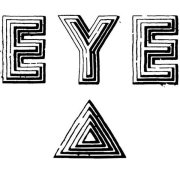 |
 |
Center of the Sun (2011, 43.34) ****/TTTCenter of the SunUsurpers Restorers Rik Rite |
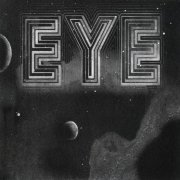 |
7" (2012) ****/TT½ Backdoor Jane Wooden Nickels |
 |
Second Sight (2013, 44.56) ****½/TTTTLost Are the YearsWooden Nickels Cultrider Second Sight Waiting for the Tide |
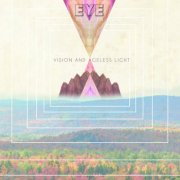 |
Vision & Ageless Light (2016, 46.21) ****/TTTBook of the DeadKill the Slavemaster Searching Dweller of the Twilight Void As Sure as the Sun |
Current availability:
Mellotrons used:
Ohian psychonaut trio Eye's debut, 2011's Center of the Sun (initially only available as a 'set your own price' download) is a superb slice of heavy space-rock; these guys are clearly majorly in thrall to Hawkwind. And why not? The album opens with the side-long title track, which shifts through several sections, not least an early '70s boogie passage; you know, the rhythm that later metal bands dropped without a backwards glance. The 'shorter' tracks on side two (this is now available on vinyl) are of comparable quality; how come this bunch are so obscure? Guesting keys man Adam "Smitty" Smith plays genuine Mellotron, strings and flutes all over the opening title track (spot the 'can't fake that' wobblies on some of the flute notes), choirs on Usurpers and more strings and flutes on the last two tracks. While the Mellotron isn't omnipresent, it's used heavily enough to be considered as a fairly major player in the band's sonic arsenal.
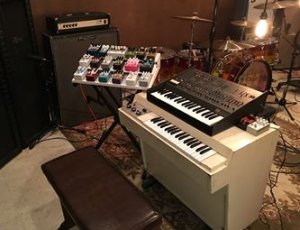 |
The following year's Backdoor Jane b/w Wooden Nickels highlights two very different sides of the band, the 'A', being a full-on, dual-guitar instrumental, while the flip is a reflective acoustic number, all harmony vocals and trippy lyrics. Mellotron on the 'B' only, with lush flute, string, brass and vibes (!) parts across the board.
Second Sight is even better than their debut, from the multiple parts of side-long opener Lost Are The Years, to the killer circular riff on Cultrider and gentle closer Waiting For The Tide. This is the sound of a band whose sound is coming to maturity as they work together, their writing coalescing into something very special indeed. Smith plays Mellotron on every track, with flutes, cellos and strings on Lost Are The Years, strings and flutes on Wooden Nickels, cellos and strings on Cultrider, super full-on strings (and choir samples) on the title track (spot the tape-mangling around three minutes in) and flutes on Waiting For The Tide.
After a three-year gap, Vision & Ageless Light, while excellent, is possibly not quite up to the standard of its predecessor, despite (?) featuring a twenty-seven-minute track. Highlights? Opening keyboard extravaganza Book Of The Dead, Kill The Slavemaster and the folk/prog of Dweller Of The Twilight Void, perhaps, although nothing here disappoints. That near-half hour epic, closer As Sure As The Sun, has some superb sections, but is possibly slightly too disjointed to be considered the band's finest hour. Lisa Bella Donna on keys, going fucking crazy on what appears to be twin ARP 2600s in a couple of places, plus, of course, Mellotron. The album opens with a solo Mellotron section, strings and cellos battling it out too see which can be wobblier; hey, at least we know it's real... We also get minor string use on Kill The Slavemaster and Dweller, with more upfront parts, plus flutes (and sampled brass and choir) on As Sure As The Sun.
See: Samples etc. | Lisa Bella Donna
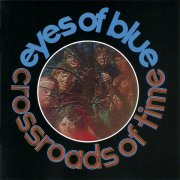 |
Crossroads of Time (1969, 42.56) ***½/TTT |
|
| Crossroads of Time Never Care I'll Be Your Friend 7 + 7 is Prodigal Son Largo Love is the Law Yesterday |
I Wonder Why World of Emotion Inspiration for a New Day |
|
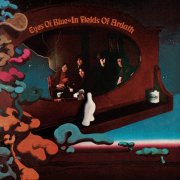 |
In Fields of Ardath (1969, 39.10) ***½/TTT |
|
| Merry Go Round The Light We See Souvenirs (Tribute to Django) Ardath Spanish Blues Door (The Child That is Born on the Sabbath Day) Little Bird After the War |
Extra Hour Chances |
|
Current availability:
Mellotrons used:
Welsh proto-progsters Eyes of Blue (with a Man connection) straddle the divide between late-psych and early prog with ease, though it probably wouldn't have been seen that way at the time. Their debut, Crossroads of Time, is far too good to languish in the obscurity in which it finds itself; why isn't this album better known? Material of the quality of the title track and Largo should be far better known in psych fandom, although I'm not entirely sure the band should've covered either Love's 7 + 7 Is or the ubiquitous Yesterday, although they turn the latter into a blues/psych-fest of decent enough proportions, so all is forgiven. Not entirely sure who plays the Mellotron, although Phil Ryan seems the most likely candidate, beginning with a few brief string notes at the end of the opening title track and a muffled flute part on Never Care. The album's real Mellotron monsters are Largo and Love Is The Law, both smothered in MkII strings, even Yesterday getting flute and string parts in.
Their second and last album, In Fields of Ardath, opens with the most progressive track on the album, the nine-minute Merry Go Round (written for the film Toy Grabbers), while the rest of the record steers a path through light guitar jazz (Souvenirs), acoustic balladry (Chances) and, er, blues (Spanish Blues), although a psych/prog crossover is their default setting. Merry Go Round doubles Mellotron strings (MkII) and organ, while Door has some upfront strings over the song's bridge. Little Bird has a fantastic Mellotron flute section, involving playing the instrument considerably faster than its design spec, adding a radical pitchbend at the end, on top of the brass earlier in the song, while the other two highlighted tracks have more 'standard' string parts. Incidentally, the band subsequently changed their name to Big Sleep, releasing their sole album in '71.
See: Big Sleep
 |
The Making of Mr Spoons (2003, 56.14) **½/T½ |
|
| Inside Me Again (Immigrants Table) Waiting for Too Long Everybody Forgets Sometimes Mr Spoons Song 4 the Tempted Take Me Away The Same Mistake Mermaid Song |
Shadow Boxers Sometimes I Wish My Friend Tonight (Darkness) The Further We Stretch |
|
 |
This is the Day (2010, 48.17) **½/T½ |
|
| A Small Dream Bad Bad Place This is the Day Supermarkets Bruce Springsteen Can't Stop Dreaming Marina Bicycle |
Each Time You Cry The One and Only One Mad at Myself I Still Want You |
|
Current availability:
Mellotrons used:
Ezio are named for vocalist Ezio Lunedi, although they seem to be a proper band, as against a singer with backing musicians. 2003's The Making of Mr Spoons is a reasonable pop/rock singer-songwriter effort, although, like many similar, the lyrics seem to take precedence over the music, leading to a position where no tracks stand out in particular. The effect isn't helped by a preponderance of overlong material, although I'm sure Mr Lunedi would argue that the length is determined by the lyrical content. Three credited Mellotron tracks, with a couple of faint flute swells on Mr Spoons and more obvious flutes and strings on The Same Mistake (listen for the solo flute note at the end) from Lee Russell, plus a flute melody on Mermaid Song from Ezio himself. The clear, but uncredited string line on Shadow Boxers, presumably from either Felix Huber or Stephan Fischer, is probably samples, ditto the strings on The Further We Stretch. Incidentally, the album timing above is minus the irritating seventeen minute-plus gap between My Friend Tonight (Darkness) and the 'hidden' The Further We Stretch.
2010's This is the Day has something of a rockabilly feel about it; less so than, say, Jace Everett, although far too much of it sinks into a kind of Brit-country swamp, particularly towards the end of the record, honourable exceptions being the sort-of rocking The One And Only One and closer I Still Want You for its lyrics, a subtle tale of accidental man-love. "Thought I was the one for you, but I was out by twenty-three". Very good... Lunedei plays Mellotron, with a big string part on the title track, background cello on Supermarkets and strings on the second half of the (relatively) lengthy Mad at Myself, improving the tracks on which it's heard; there might be more, but it's difficult to differentiate from the real strings used in places, especially the cello. Good job it's not a Chamberlin, eh?
See: Samples etc.